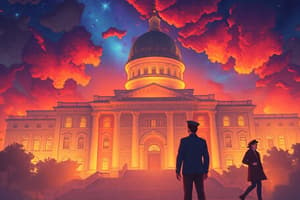Podcast
Questions and Answers
What is the primary reason civil servants are expected to remain impartial?
What is the primary reason civil servants are expected to remain impartial?
- They must support the political party in power.
- They are elected government officials.
- They serve to maintain continuity across governments. (correct)
- They work under the authority of ministers.
What does the Civil Service Commission do?
What does the Civil Service Commission do?
- Selects civil servants based on political connections.
- Provides funding for government departments.
- Recruits civil servants through competitive examinations. (correct)
- Oversees the actions of elected officials.
Who is the most senior civil servant in the UK Civil Service?
Who is the most senior civil servant in the UK Civil Service?
- Cabinet Secretary (correct)
- Secretary of State
- Prime Minister
- Permanent Secretary
Which of the following is NOT a task expected of civil servants?
Which of the following is NOT a task expected of civil servants?
What is the primary qualification for civil servants employed in ministries?
What is the primary qualification for civil servants employed in ministries?
Why is mobility between departments encouraged for civil servants?
Why is mobility between departments encouraged for civil servants?
How many people were employed in the Civil Service around 2013?
How many people were employed in the Civil Service around 2013?
Which department employs the most civil servants according to the content?
Which department employs the most civil servants according to the content?
What perception was popularized by the British comedy series 'Yes, Minister'?
What perception was popularized by the British comedy series 'Yes, Minister'?
How do civil servants maintain their reputation for impartiality?
How do civil servants maintain their reputation for impartiality?
Flashcards
Civil Service
Civil Service
The group of professional government employees who work for the government in different departments and institutions.
Political Neutrality
Political Neutrality
The principle that civil servants should be impartial and not favor any political party.
Cabinet Secretary
Cabinet Secretary
The head of the Civil Service, who works directly for the Prime Minister.
Permanent Secretary
Permanent Secretary
Signup and view all the flashcards
Merit-based Recruitment
Merit-based Recruitment
Signup and view all the flashcards
Departmental Rotation
Departmental Rotation
Signup and view all the flashcards
Civil Service Power
Civil Service Power
Signup and view all the flashcards
Civil Service Conservatism
Civil Service Conservatism
Signup and view all the flashcards
Expansion of Civil Service
Expansion of Civil Service
Signup and view all the flashcards
Civil Service Integrity
Civil Service Integrity
Signup and view all the flashcards
Study Notes
The Civil Service
- The civil service comprises the vast majority of government employees, distinct from ministers (politicians).
- Modern civil service, established in 1855, is meritocratic, selecting employees based on talent and competitive examinations, not political affiliation.
- Civil servants must be impartial, neutral in party politics, and loyal to both outgoing and incoming governments.
- Professionalism and political neutrality are crucial to their function.
Civil Service Hierarchy
- The Cabinet Secretary heads the Cabinet Office and reports directly to the Prime Minister.
- Permanent Secretaries lead each government department, advising ministers and translating political ideas into practical action.
- Key tasks include drafting bills, reports, white papers, and turning Acts of Parliament into actions.
Civil Service Characteristics
- Civil servants are typically university graduates, selected based on problem-solving skills, adaptable expertise, and hierarchical cooperation.
- Civil servants are often employed for life, but move between departments to gain broader experience and understanding of government systems.
- Offers advanced training at specific Civil Service Colleges.
Civil Service Size and Roles
- In 2013, the UK civil service employed nearly 450,000 people.
- Roles extend beyond traditional departments, encompassing the expanding welfare state (e.g., Department for Work and Pensions, Ministry of Defence) and other crucial duties (tax collection, courts, education, prisons).
- The increased influence of devolved governments in Scotland and Wales also employ civil servants.
Perceptions and Criticisms
-
A common misperception portrays civil servants as the true power behind government, with politicians acting as passive advisors, as seen in the comedy series Yes, Minister.
-
Some suggest a conservative bias in the Civil Service, hindering radical reforms.
-
However, there's scarce proof supporting these criticisms.
-
Civil Service enjoys a high reputation for neutrality and minimal corruption.
Studying That Suits You
Use AI to generate personalized quizzes and flashcards to suit your learning preferences.




